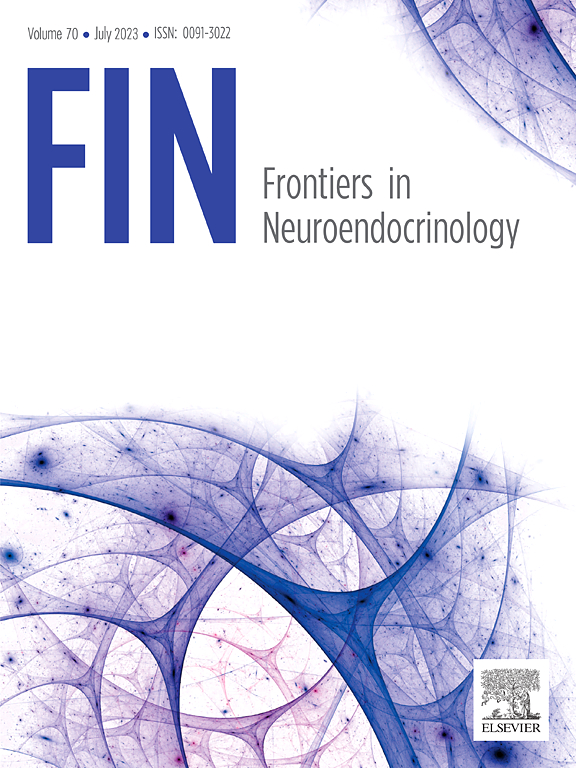Binge alcohol and the neuroendocrinology of the aging female
IF 6.7
1区 医学
Q1 ENDOCRINOLOGY & METABOLISM
引用次数: 0
Abstract
Aging and alcohol exert marked effects on the endocrine system – in particular the hypothalamic-pituitary–gonadal (HPG) and hypothalamic–pituitary–adrenal (HPA) axes. The aging female brain represents a unique substrate for alcohol effects, given that both the HPG and HPA undergo significant changes with aging in women, making this demographic notably different from both males and younger females. Little attention has been directed at alcohol effects in this group but changing trends in women’s drinking have brought these issues to the forefront. Major gaps in our understanding of aging females include how stressors common to middle and older aged women impact alcohol consumption, and how alcohol consumption in older women impacts brain health and aging. Thus, here we review the current state of knowledge concerning the unique neuroendocrinology of aging females, their stressors and pharmacokinetic reactions to alcohol, and their interactions as causes and neurotoxic consequences of excessive alcohol drinking. We highlight the role of the neuroimmune system at the intersection of aging, alcohol and stress effects, and brain endocrine systems. We conclude that therapeutic interventions should be aimed at managing alcohol-induced neuroimmune responses and their downstream effects on vulnerable white matter. In addition, mid-life represents a window of opportunity in which to introduce strategies to limit alcohol consumption and its consequences for the aging female brain. As so little is known about how alcohol intake impacts brain health in females, let alone in aging females, we assert the need for further investigation of middle-aged and aged females in human and preclinical studies.
酗酒与老年女性的神经内分泌学
衰老和酒精对内分泌系统有显著影响,尤其是下丘脑-垂体-性腺轴(HPG)和下丘脑-垂体-肾上腺轴(HPA)。衰老的女性大脑代表了酒精作用的独特基质,因为HPG和HPA都随着女性年龄的增长而发生显著变化,这使得这一人口统计学与男性和年轻女性明显不同。很少有人关注酒精对这一群体的影响,但女性饮酒趋势的变化使这些问题成为人们关注的焦点。我们对老年女性认识的主要差距包括中老年女性常见的压力因素如何影响饮酒,以及老年女性饮酒如何影响大脑健康和衰老。因此,在这里,我们回顾了目前关于老年女性独特的神经内分泌学知识,她们的压力源和对酒精的药代动力学反应,以及它们作为过量饮酒的原因和神经毒性后果的相互作用。我们强调神经免疫系统在衰老、酒精和压力效应以及脑内分泌系统的交叉作用。我们的结论是,治疗干预应旨在控制酒精诱导的神经免疫反应及其对脆弱白质的下游影响。此外,中年是引入限制饮酒及其对女性大脑衰老影响的策略的机会之窗。由于对酒精摄入如何影响女性大脑健康知之甚少,更不用说老年女性了,我们认为有必要在人体和临床前研究中对中老年女性进行进一步调查。
本文章由计算机程序翻译,如有差异,请以英文原文为准。
求助全文
约1分钟内获得全文
求助全文
来源期刊

Frontiers in Neuroendocrinology
医学-内分泌学与代谢
CiteScore
13.30
自引率
6.80%
发文量
62
审稿时长
68 days
期刊介绍:
Frontiers in Neuroendocrinology (FIN) publishes a wide range of informative articles including comprehensive reviews, systematic reviews, opinion pieces, and meta-analyses. While the majority of reviews are invited, we also embrace unsolicited reviews and meta-analyses, as well as proposals for thematic special issues, provided they meet our rigorous quality standards. In addition, we encourage authors to submit commentaries that concisely present fresh ideas or offer further analysis to delve deeper into the implications of an article published in our journal.
 求助内容:
求助内容: 应助结果提醒方式:
应助结果提醒方式:


